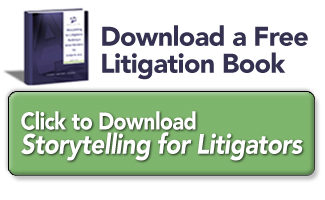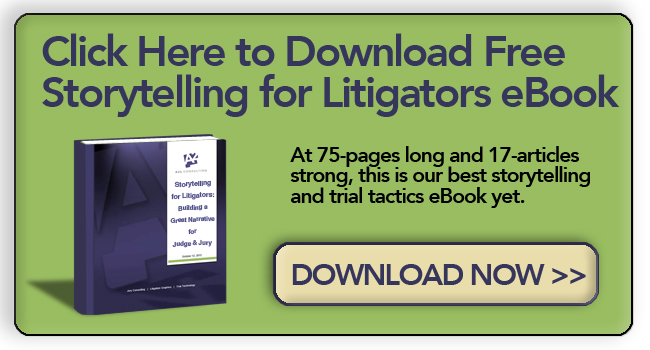by Ken Lopez
Founder/CEO
A2L Consulting
In my 18 years in the litigation consulting business, I've noticed that there are two types of trial lawyers. The first one is what I call a timeline lawyer. Usually, his or her opening statement always starts at the beginning, in terms of time, and ends at the end.
The second type, and by far the more successful type of trial lawyer, is the storyteller. Storytellers don't start at the beginning unless it serves them, and normally it does not.
Instead, the storyteller will begin where the story ought to begin. Usually it takes a form similar to this: Things used to be this way, then something happened, and now they have changed. Sometimes the storytelling trial lawyer will also follow Joseph Campbell’s paradigm of the hero’s journey. We have prepared an infographic that places the hero’s journey in context for trial.
We have written often about storytelling. We've shared how storytelling is being used increasingly as a persuasion device in the courtroom. We have offered five tips for effective storytelling in court. We have even produced an entire book, which is a free download, called Storytelling for Litigators.
That's not to say that timelines are a bad thing. Timelines are, in fact, key exhibits in most trials. They help orient the fact finder and serve as a memory stimulator for the trial lawyer and expert witness alike. They can also serve as a persuasion device if they are set up as a permanent exhibit at trial. Given the importance of timelines, you will not find it surprising that we've written an entire book about trial timelines too! And yes it's a free download.
I still advise you to rethink your strategy if your plan is to start at the beginning and end at the end. It's not a very effective strategy at all. You want your fact finders to care. You have to provide meaning and context for a judge or jury. As our senior jury consultant said in a related article, "[jurors] start at the end and work backward, forming a general theory into which they fit specific evidence from the top down. Once a juror’s theory is formed, new information is filtered through that theory and tested for how well it fits with the theory. Information confirming the theory is selectively attended to; ill-fitting information is missed, ignored, forgotten, or distorted to fit the theory, through cognitive dissonance."
We see this play out all the time. In a recent mock trial exercise, we watched as mock plaintiffs' counsel developed a story with meaning and emotional connection. Then we watched as our client, who was using the mock trial properly to figure out the best strategy for trial, stood up and told a chronological story that was so logical and syllogistic that a computer would certainly have found for the defendant.
However computers don't decide cases. In fact, here, all the mock jury panels came back vigorously against our client. When asked if they could articulate the story of each side during deliberations, the mock jury was able to spit out an elevator speech of the plaintiffs’ case in seconds complete with emotional meaning and impact. However not a single juror was able to articulate the defense story with any clarity.
Unless we tell stories and ask judges and juries what we want from them and give them an easy roadmap for giving us what we ask for, we're doing our clients a horrible disservice. Use your timelines in every case, but don't use them to organize your openings and closings, and you'll be a more successful trial lawyer for it.
Other related A2L consulting articles related to storytelling and timelines:
- Your Trial Presentation Must Answer: Why Are You Telling Me That?
- 20 great storytelling articles from trial experts
- Watch a master storyteller make a pitch for his charity
- Learn about storytelling from Nancy Duarte
- 10 videos to help litigators get better at telling stories at trial
- Free e-book download: Storytelling for Litigators
- No Story, No Glory: Closing Arguments that Don't Close Loops







Leave a Comment